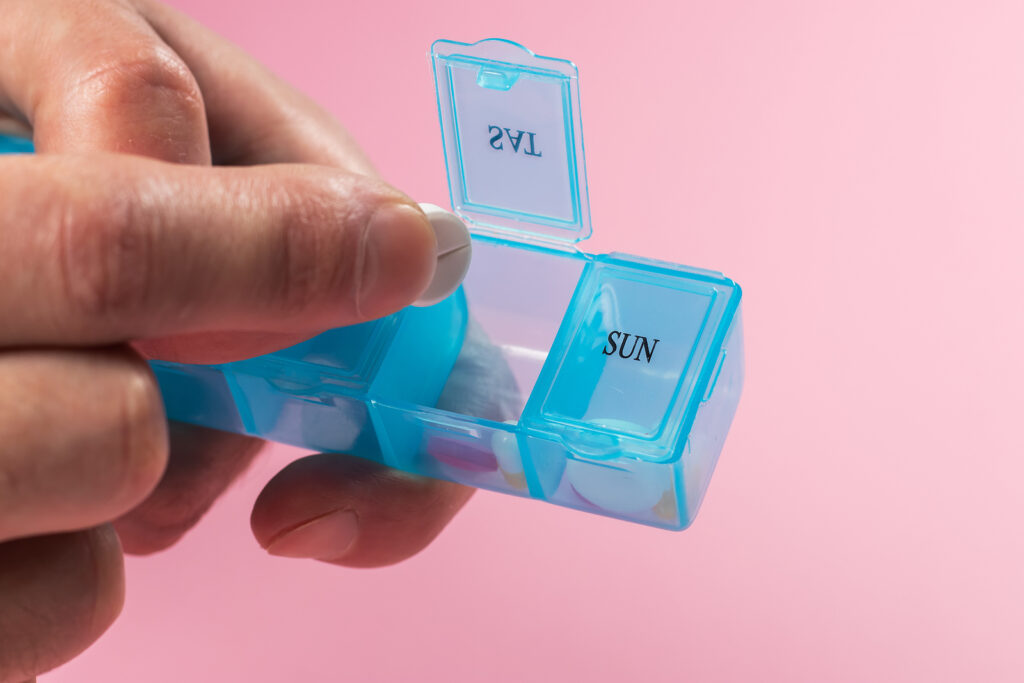Attention Deficit Hyperactivity Disorder (ADHD) is a neurodevelopmental disorder that affects millions of people around the world. ADHD can make it difficult to focus, complete tasks, and regulate impulses. While medication is often used to manage ADHD symptoms, it is not the only option. In this article, we will discuss the difficulties and side effects associated with ADHD medications, the benefits of not taking ADHD medication, and offer 10 proven tips and tricks that can help you manage your ADHD without medication.
Difficulties and Side Effects Associated with ADHD Medications

ADHD medications are designed to help manage the symptoms of ADHD by increasing levels of neurotransmitters in the brain. The most commonly prescribed ADHD medications are stimulants such as Ritalin, Adderall, and Concerta. While these medications can be effective, they can also come with side effects. One common side effect is appetite suppression, which can lead to weight loss or malnutrition. Some medications can also cause insomnia, which can lead to fatigue and difficulty concentrating during the day.
Additionally, certain ADHD medications may increase heart rate and blood pressure, which can be a concern for individuals with preexisting cardiovascular conditions. It’s also important to consider the potential for dependence or addiction to these medications, especially in individuals with a history of substance abuse or addiction. In some cases, ADHD medication may be misused or abused, which can lead to serious health consequences. Moreover, ADHD medications can be expensive and not covered by insurance, making it difficult for individuals to access the treatment they need. Stigma and misunderstanding surrounding ADHD and its treatment can also make it challenging for individuals to seek help or adhere to their medication regimen. While medication can be helpful for managing ADHD symptoms, they are not a cure, and should always be used under the guidance of a medical professional.
Other common side effects of ADHD medications include:
- Nausea
- Headaches
- Irritability
- Mood swings
- Anxiety
- Depression
- Tics
Benefits of Not Taking ADHD Medication
As an expert on ADHD, I understand that while medication can be effective in managing symptoms, it is not the only option for individuals with this condition. In fact, there are several benefits to exploring non-medication options for ADHD treatment.
One key benefit of not taking medication is that it allows individuals to explore alternative approaches that may be better suited to their unique needs and preferences. For example, some individuals may find that behavioral interventions, such as cognitive-behavioral therapy or coaching, are effective in improving their attention and reducing impulsivity. These interventions can help individuals develop skills and strategies to better manage their symptoms and cope with the challenges of daily life.
Another benefit of not taking medication is that it avoids the potential side effects and risks associated with medication.
While medication can be effective in managing ADHD symptoms, it can also cause side effects such as insomnia, decreased appetite, and elevated heart rate. In addition, some individuals may be at increased risk for dependence or addiction to medication, or may have other medical conditions that make medication less safe or effective.
Not taking medication also allows individuals to take a more holistic approach to managing their ADHD. This might include focusing on lifestyle factors such as exercise, sleep, and nutrition, as well as incorporating mindfulness practices or relaxation techniques to reduce stress and improve focus. By addressing these factors, individuals may be able to reduce the severity of their symptoms and improve their overall quality of life.
It’s important to note that the decision to take medication or pursue other treatment options for ADHD is a personal one, and should be based on an individual’s unique needs and circumstances. At The ATTN Center, we work with individuals to explore the various options available to them, and to develop a treatment plan that is tailored to their specific needs and goals by using our unique ADHD-Focused Therapy approach. Contact us today to learn more.

Proven Tips to Manage ADHD Without Medication
1. Exercise Regularly
Exercise is one of the most effective ways to manage ADHD without medication. Regular exercise can help improve focus, reduce hyperactivity, and improve mood. Exercise also helps increase the levels of dopamine, norepinephrine, and serotonin in the brain, which can help improve ADHD symptoms.
2. Improve Your Sleep Habits
Getting enough sleep is essential for managing ADHD symptoms. Lack of sleep can lead to decreased focus, irritability, and hyperactivity. Try to establish a regular sleep routine, avoid caffeine and electronics before bed, and create a calming sleep environment.
3. Eat a Balanced Diet
A balanced diet can help improve ADHD symptoms by providing the brain with the nutrients it needs to function properly. Foods that are high in protein, healthy fats, and complex carbohydrates can help improve focus and reduce hyperactivity. Avoiding processed foods, sugar, and caffeine can also help improve ADHD symptoms.
4. Practice Mindfulness
Mindfulness meditation can help improve focus and reduce hyperactivity by training the brain to stay present and focused. There are several apps and resources available that can help you learn how to practice mindfulness meditation.
5. Use a Planner
Using a planner can help you stay organized and on top of tasks, which can be especially helpful for managing ADHD symptoms. Set aside time each day to plan out your schedule and prioritize tasks.
6. Break Tasks into Smaller Steps
Breaking tasks into smaller steps can make them feel more manageable and help reduce feelings of overwhelm. Set achievable goals for each step and reward yourself for completing them.
7. Establish Routines
Establishing routines can be incredibly helpful for individuals with ADHD. Routines help create structure and predictability, which can reduce stress and anxiety. Establishing routines for waking up, going to bed, meals, and other daily activities can help individuals with ADHD stay organized and focused.
8. Minimize Distractions
Distractions can be a major challenge for individuals with ADHD. Creating a workspace that is free from distractions can help individuals with ADHD stay focused on their tasks. This could include finding a quiet place to work, turning off notifications on devices, and using noise-canceling headphones.
9. Use Visual Aids
Visual aids can be incredibly helpful for individuals with ADHD. Creating a visual schedule, using color-coding for tasks, and using visual reminders can all help individuals with ADHD stay organized and on track. Visual aids can also be helpful for breaking down complex tasks into smaller, more manageable steps.
10. Seek Support with Cognitive Behavioral Therapy
Finally, seeking support is crucial for managing ADHD without medication. This could include working with a therapist or coach who specializes in ADHD, joining a support group, or seeking out resources and information on managing ADHD. The most effective way to manage ADHD without medication is with Cognitive Behavioral Therapy. Cognitive Behavioral Therapy (CBT) is based on the idea that our thoughts, feelings, and behaviors are interconnected, and that changing negative or unhelpful thoughts and behaviors can lead to positive changes in our emotions and overall well-being. In this article, we will discuss how and why CBT can be helpful in managing ADHD symptoms without medication.
What Does ADHD-Focused Therapy Look Like?
CBT can help individuals with ADHD by targeting specific cognitive and behavioral patterns that are associated with ADHD symptoms. For example, CBT can help individuals with ADHD:
- Identify and challenge negative or unhelpful thoughts and beliefs about themselves and their abilities.
- Learn skills to manage impulsivity, such as mindfulness and relaxation techniques.
- Develop organizational and time-management skills to help them stay focused and on task.
- Learn problem-solving skills to help them overcome obstacles and challenges.
- Practice social skills to help them communicate effectively and build positive relationships.
By targeting these specific areas, CBT can help individuals with ADHD develop the skills and strategies they need to manage their symptoms without relying on medication.
Is CBT Effective for ADHD?
CBT is effective for managing ADHD symptoms for several reasons:
- CBT is Evidence-Based
CBT is a well-established and evidence-based form of therapy that has been shown to be effective for a wide range of mental health conditions, including ADHD. Numerous studies have shown that CBT can lead to significant improvements in ADHD symptoms, and these improvements can last over time.
- CBT is Tailored to the Individual
CBT is a highly individualized form of therapy that is tailored to the specific needs of each person. This means that the therapist will work with the individual to identify their specific symptoms and challenges, and develop a treatment plan that is tailored to their needs.
- CBT is Collaborative
CBT is a collaborative form of therapy, which means that the therapist and individual work together to identify and achieve goals. This collaborative approach can be especially helpful for individuals with ADHD, who may struggle with impulsivity and difficulty working with others.

- CBT Teaches Skills and Strategies
CBT teaches individuals with ADHD the skills and strategies they need to manage their symptoms in the long-term. Rather than relying on medication, individuals with ADHD can develop skills and strategies that can be used throughout their life to manage their symptoms and improve their overall well-being.
In summary, CBT can be a highly effective way to manage ADHD symptoms without medication. By targeting specific cognitive and behavioral patterns, CBT can help individuals with ADHD develop the skills and strategies they need to manage their symptoms in the long-term. CBT is evidence-based, tailored to the individual, collaborative, and teaches skills and strategies that can be used throughout life. If you are struggling with ADHD symptoms, consider speaking with a qualified therapist who specializes in CBT to learn more about how it can help you.
Start Learning to Manage ADHD Without Medication
The ATTN Center in New York City specializes in CBT for ADHD. We have helped thousands of people with ADHD manage their symptoms without medication. Reach out today to speak with one of our expert ADHD Therapists, who specialize in ADHD-Focused Therapy. You can start your therapy journey with The ATTN Center by following these steps:
- Reach out to us through our convenient online therapy contact page!
- Learn more about our team and the services offered here!
- Begin the journey to understanding your diagnosis and living your best life!
Other ADHD Services Offered by The ATTN Center in NYC
We understand that different aspects of your life may be affected by ADHD. Our team is happy to offer a variety of services to support you in coping with ADHD symptoms. This includes therapy for ADHD-related anxiety and depression, group therapy, ADHD-focused therapy, testing, and neurofeedback options. At ATTN Center of NYC, we do everything in our power to treat ADHD without the use of medication, but we understand in some severe cases additional measures may be needed. As a result, we also maintain close relationships with many of NYC’s best psychiatrists as well. Feel free to learn more by visiting our blog or FAQ page today.